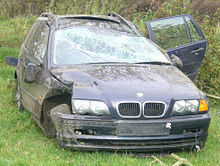Total loss

In insurance, a total loss or write-off is a judgement, by an insurer, concerning recovered or salvaged damaged property (as distinct from complete losses, such a house buried under a landslide, or the financial underperformance of insured speculative investments) in which it determines that the cost of repair exceeds the value of its policy, and so it pays the insured as if their property had in fact been totally destroyed.[1][2] Less expensive properties (such as vehicles) are therefore more commonly written off than major assets such as buildings or shipping; with the property then said to have been "totaled" (the term "totaled" has entered popular vocabulary as descriptive of any wrecked property regardless of its insurance).
Auto insurance
United Kingdom
In the UK, a car in this condition is called a write-off, it is worth noting that although a car has been written off, it is not truly worthless, in that usually it will still contain salvageable used parts, or at a bare minimum still have value as scrap metal. All that is required for a vehicle to be a write-off is that it would cost more to return to marketable condition than the market value it would then have. So a vehicle of low value may even be written off when fully roadworthy, for example due to damage to paintwork or upholstery.
Write-offs can be distressing for the owner as the amount offered by the insurance company is normally its "market value" at the time. If the car was rare, or simply in excellent condition compared to others of its age and type, the market value may not allow the owner to purchase an identical vehicle. For this reason, many insurers offer "agreed value" cover for owners of classic vehicles, which guarantees a set financial sum in the event of a total loss. There is normally a rule that the vehicle must be at least 10 (or 15) years old for mass-market models, although for specialist cars, such as Ferraris, agreed value cover may be available from an earlier age.[citation needed]
US and Canada

In many jurisdictions a vehicle designated as a "total loss" (commonly referred to in the US as being totaled) is sold by insurance companies to general public, auto dealers, auto brokers, or auto wreckers. The metrics insurance companies use to make the decision include the cost of the repairs needed plus the value of the remaining parts, added to the cost of reimbursing the driver for a rental while the car in question is repaired.[citation needed] If this figure exceeds the value of the car after it is repaired, the vehicle is deemed a total loss. If the vehicle is not severely damaged, it can be restored to its original condition. After a government approved inspection, the vehicle can be put back on the road. However, the inspection may not reveal the quality of repair job. A professional mechanic or inspector should be consulted to make sure repairs are of proper quality and adequate. However, if the vehicle is severely damaged as per standards set by state or provincial governments, the vehicle is dismantled by an auto wrecker and is sold as parts or scrapped.
Diminished Value is the reduction in a vehicle's market value occurring after a vehicle is wrecked and repaired, otherwise called accelerated depreciation. A reasonable person will not pay the same price for a wrecked-then-repaired vehicle as they will for a vehicle with no prior accident history. Even if the repairs are proper, the vehicle will still lose value. To collect diminished value after a car accident, insurance companies usually ask for a diminished value report.
In Canada, this is more commonly called accelerated depreciation; how a person goes about reclaiming those losses in either country is a different process. In some states, insurance companies acknowledge diminished value and provide this coverage direct to their consumers. In Canada, in order to recuperate the lost value after an accident, a person needs to retain legal council and order an acceleration depreciation report on their car for the courts use.
Developing countries
This section possibly contains original research. (November 2012) |
In developing countries, the wages paid to mechanics and other repair personnel can be a fraction of the wages paid in developed countries. Also, the regulatory standards for certifying and testing vehicles for roadworthiness may not be as strict. Since labor rates and regulatory compliance are a significant portion of automotive repair costs, major repair work could be much cheaper to perform in a developing country, raising the threshold of what damage level would be declared a total loss. Correspondingly, in some developing countries such as Paraguay there is a growing market for totaled North American cars, which are repaired and resold locally. However, the quality of the repair may vary.
See also
References
- ^ "Cambridge Dictionary - Write-off". Dictionary. Cambridge Dictionary. Retrieved 3 December 2012.
- ^ "The Free Dictionary - Write-off". Dictionary online. The Free Dictionary. Retrieved 3 December 2012.
